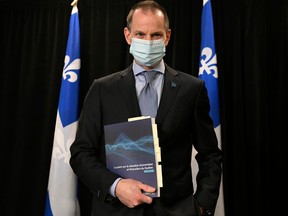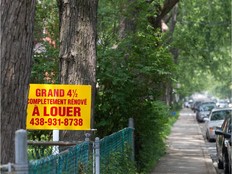A key election promise of the Coalition Avenir Québec, the money is the final phase of the party's so-called anti-inflation shield.

QUEBEC — Following up on those pre-Christmas cheques for millions of Quebecers, the Legault government now is coming to the aid of seniors struggling with the cost of living.
But the government is warning the days of Quebec’s record economic growth are coming to an end as the full effects of a worldwide slowdown take hold. To that end and “as a precaution,” Quebec has developed an alternative scenario in which the province’s economy would enter a recession.
Sign up to receive daily headline news from the Montreal Gazette, a division of Postmedia Network Inc.
Thanks for signing up!
A welcome email is on its way. If you don't see it, please check your junk folder.
The next issue of Montreal Gazette Headline News will soon be in your inbox.
The scenario, or Plan B, includes an $8-billion contingency fund — spread over five years — “for economic risks” and to offset the downturn.
Tabling his fall economic update Thursday, Finance Minister Eric Girard confirmed previously announced plans to increase the maximum amount of the refundable senior assistance tax credit from $411 a year to $2,000, beginning this year.
The measure applies to those 70 and older who already receive this tax credit, and adds to the list of eligible recipients, Girard said. The news means an additional 398,500 seniors will have access to the credit, for a total of 1.1 million people.
The money was a key election promise of the Coalition Avenir Québec, and is the final phase of the party’s so-called anti-inflation shield. A total of 65 per cent of the assistance will go to seniors with an annual income of less than $25,000. The measure will cost Quebec $8 billion over five years.
If you add all the previous measures announced for 2022, the total relief for eligible seniors living alone will be $3,100. For a couple, the amount is $2,200.
Girard has also announced a plan to index the income tax system and social assistance programs to reflect increases in the prices of goods and services, to the level of 6.44 per cent. That indexation kicks in Jan. 1 and represents an additional $2.3 billion in relief.
As an example, a couple with two children and a total income of $100,000 stand to make a gain of $1,004, which includes $537 from the indexing of the tax system and $467 from an increase in family allowance.
But one day before the National Assembly recesses for Christmas, Girard’s update confirmed what he has been saying for weeks: Quebec’s economy is slowing down at an alarming rate, with little relief in sight in the short term.
“The economic outlook for Quebec and Canada has deteriorated quickly,” the update states. “A high degree of uncertainty hangs over the economic and financial forecast.”
The document spells things out bluntly: Quebec’s economic growth is expected to slow from 3.1 per cent in 2022 to 0.7 per cent in 2023. In his March budget, Girard had predicted two per cent growth for 2023.
Job creation will also slow down, resulting in what Girard says will be a temporary rise in unemployment, to an average of five per cent per year in 2023.
And while Girard says he believes inflation peaked at eight per cent in June, the full effects of the slowdown and increases in lending rates by the central bank have yet to be felt.
As a precaution, he included the alternative scenario featuring an $8-billion contingency fund over five years.
“We believe the recession is, more or less, within a 50 per cent probability,” Girard told reporters at a news conference. “It’s good policy to have provisions for contingencies, whether they are pandemic- or economic-related.”
Under the recession scenario, economic activity would decline by one per cent in 2023 before increasing by 1.2 per cent in 2024. The overall negative impact on Quebec’s finances would be a whopping $5 billion in 2023, which would lead to a $4.1-billion deficit in 2023-24.
Various options are on the table to counter a recession, including more direct aid for households and businesses or an increase for public investments in infrastructure.
“For individuals, we have suggested if the economy slows down, it is the appropriate time for a fiscal stimulus,” Girard noted. “The fiscal stimulus we have highlighted as possible would be an income tax reduction.”
In the last election, the CAQ pledged an income tax cut — a promise restated by Premier François Legault in his interview with the Montreal Gazette last month.
For now, Girard’s budgetary deficit projection for 2022-23 remains lower than he said it would be in the March budget. That’s because that same high inflation rate has driven up Quebec’s own source revenues by about $14 billion.
Of that money, $13.2 billion is being turned back over to citizens by Girard with his cost-of-living measures.
Girard is also able to lower a projected $6.5-billion deficit for 2022-23 to $5.2 billion, including a mandatory contribution to the debt-reducing Generations Fund. Quebec is still on track to balance its books by 2027-28, Girard said.
The update represents a followup to a series of other measures promised by the CAQ during the election campaign to help Quebecers deal with inflation.
Up first were cheques of $400 to $600 for citizens who earned less than $100,000 in 2021. A Revenue Quebec spokesperson told the Montreal Gazette Thursday that more than half of the payments — in the form of direct deposit or paper cheques — have already been sent.
Two promised cost-of-living bills have also been tabled by the CAQ and should be adopted before the legislature recesses Friday. Bill 1 slaps a three per cent ceiling on government fee increases, while Bill 2 imposes the same ceiling on hydro rates.
The opposition parties were not impressed, with Québec solidaire saying the update does not include enough specific relief measures for citizens. QS wanted Quebec to immediately increase the minimum wage from $14.25 to $18 an hour and freeze all government fees.
“It’s not generous enough, it’s not targeted enough,” added Liberal finance critic Frédéric Beauchemin. He noted seniors will have to wait until they do their income taxes in order to get the CAQ tax credit, when they need the money now.
pauthier@postmedia.com
twitter.com/philipauthier
-

Quebec minister says private pheasant hunt was not an ethics breach
-

Montreal executive committee approves height limit for Chinatown buildings







